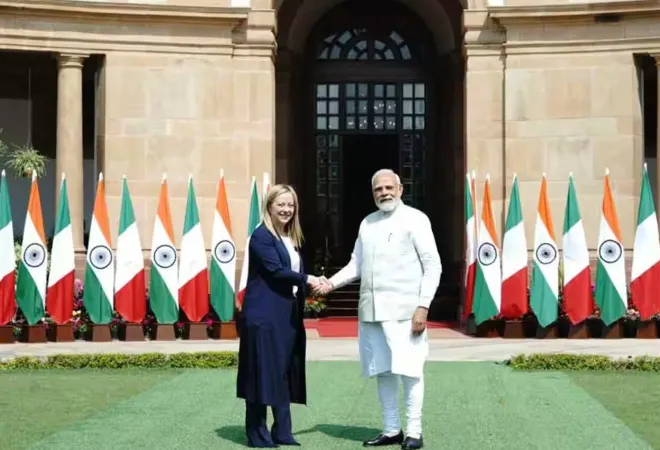-
CENTRES
Progammes & Centres
Location
At the heart of Italy’s Indo-Pacific vision lies the understanding of this region as the neighbourhood of its strategic Mediterranean Sea.

The Italian government arrived at Raisina after launching an ambitious initiative for strengthening north and western African economies - the Mattei Plan.When she underlined, “A collaboration aimed at providing tangible benefits for all. Without predatory ambitions. Without coercion, economic or otherwise,” she was marking a clear distinction from China’s debt-trap operations through the Belt and Road Initiative (BRI) in South-East and South Asia, and Africa. She was upfront in acknowledging that in the past, Europe failed to take on the problems of others, focusing exclusively on its own. While not directly mentioning the Chinese threats in Taiwan, or the Chinese provocations on the border with India or in the South China Sea, Meloni pointed to the recent European Union strategy for the Indo-Pacific as a clear signal of Europe’s return to dealing with the region, including its security priorities. During the meeting with PM Modi, the two leaders signed a series of bilateral agreements, agreeing to elevate the relations to a strategic partnership. This comes just weeks after a similar agreement was signed with Japan, and it is understood that it will soon be followed by a defence agreement that will pave the way for deeper military cooperation and joint training. Describing Italy-India relations, the Italian PM drew a parallel in the identities of the two nations – both natural centres of the Mediterranean and the Indian Ocean, and hubs of ancient cultures. And now, the intent is to make this relationship respond to the challenges of the 21st century with the launch of the India-Italy Start Up Bridge and an MoU between Rabindra Bharti University, Kolkata, and the Italian Consulate General in Kolkata, underlining the aspiration to further diversify the mutually beneficial relationship from economy and technological development to culture and knowledge production. In light of all this, an initial assessment of Meloni’s visit seems to indicate a radical and positive change for the region in Italy’s Indo-Pacific policy. As often hoped for by New Delhi, a further like-minded partner is appearing in the region, accepting the variable geography of its minilateral initiatives and pushing to integrate into them. The next steps will be for bilateral diplomacy to be able to cultivate this openness and sustain the Italian presence in the Indian Ocean as a security provider through close cooperation between the two navies and potentially the inclusion of Italy in a minilateral formula that unleashes the potential that India and Italy can realise in the Indo-Pacific.
The views expressed above belong to the author(s). ORF research and analyses now available on Telegram! Click here to access our curated content — blogs, longforms and interviews.

Professor Harsh V. Pant is Vice President – Studies and Foreign Policy at Observer Research Foundation, New Delhi. He is a Professor of International Relations ...
Read More +